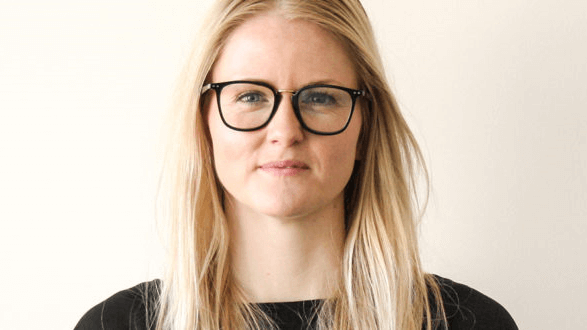High Rise: Sofie Berglund

Sofie Berglund, Partner Relations Manager and Project Manager at smart meeting solutions provider Evoko, explains why being curious but also ‘a realist’ is key to success, why old prototypes can come in useful and why sometimes you just need to let projects ‘breathe’.
What first prompted you to move into project management?
When I graduated from university, I didn’t know what I wanted to work with. I started out as a design engineer where I designed new products which I really enjoyed. Time went by and I realised I was unconsciously involved in more and more project management tasks.
I thought it was way more fun to be involved with how people could work together, thinking more of the bigger picture rather than my own part. I’ve always liked structure and making plans, so the project management role became very natural for me.
Take us through your career do date, who have you worked for?
I started my career as a design engineer at the Swedish truck company Scania AB where I designed exterior chassis parts, then I changed position within the company and became a project leader for the air inlet system. After Scania I swapped industry completely and became the team/project leader at Martela, a Finnish furniture company.
After Martela I wanted to try out consulting, so I started working for ÅF AB. I didn’t stay too long because my second assignment was for a company called SMS and Evoko, a small innovation company with massive potential. Luckily, I liked them, and they liked me so after a couple of months I crossed the fence and became an employee there instead.
What are you up to right now?
At the moment I’m working as a project manager and partner relations manager at SMS and Evoko.
I have multiple projects going on. Some are new development projects, and some are internal process projects.
Right now, we are also working the roadmap for our future products so I’m spending a lot of time on creating project plans and allocating resources.
What makes your work fulfilling and fun?
Definitely the huge variety – I do so many different things! One day I can do very academic or administrative tasks and the next I have more technical or practical things going on. I easily get bored, so this is the best combination for me.
As a project manager you also have the benefit of being there throughout the entire process, from the start all the way to the goal and that is very fulfilling for me.
Another important aspect is that I have such intelligent, open minded and kind colleagues. Every day I learn something and every day I laugh. We have such a great team which makes everyday fun.
What are your key strengths and how have you used these?
I try to be a positive realist, meaning I always want to see a solution, but it should always have some ground to it. To me it is very important to always be aware of mine and the project’s abilities and limits, knowing when I can push and when I need to step back or ask for help.
This makes my work honest and you know what to expect. I always try to think of what’s best for the project and prioritize accordingly. Also, I think I’m a pretty happy person with some killer jokes which (sometimes) brightens the atmosphere.
What aspects of the role pose the greatest challenge?
Finding a balance of getting just enough information. When handling large development projects that cover many different areas, it is hard to know how much you need to know about every subject.
As a project manager you like control; you want to know as much as possible to be able to keep track of the development. But when you are handling a project that includes everything from mechanical development to electrical to software there is no way you can know every detail.
Many times, you need to let it go no matter how interesting or fun it may be, because you need to prioritise. Many project managers including myself are control freaks and therefore letting go is hard, but you always need to know how and when to let the project breathe.
What training have you received and how has this helped you in your career?
I’ve studied project and product engineering where I learnt the basic methods on how to handle product and project processes. The university gave me the basics, but it wasn’t until I was hands-on in the real world that I really learnt how project managing works.
I started my career at a major company famous for its project management and this was the best training I could ever have wished for. Even now I’m still using a lot of the same methods that I learnt there.
What characteristics and skills do you think make a great project manager?
I think a very important attribute is to be curious. You need to be hungry for all kinds of information because you never know when it could be useful. I always eavesdrop on other people’s conversations, crash meetings and ask a lot of questions.
I think it is also very important to be curious with people. When managing a project, it is equally about managing people and the more comfortable you feel with your co-workers and they with each other, the easier it gets and the possibility of doing something good is much higher.
What are the biggest mistakes have you made and how did you correct them?
I had just worked a couple of weeks as a project leader at Scania. A new prototype truck was to be built and it was especially important that all parts were there on time due to crucial testing. The management made it very clear this truck needed to be done on time.
So, every project leader ordered their parts and so did I, but somehow I forgot to order my most crucial part. Without this part, the truck can’t move a metre, so this was an issue you could say. When I realised I just wanted to disappear, so I hid in a corner.
While standing there and trying to get my pulse back down to normal I spotted something at the back of a shelf in the office. I dug it out and realised that this was an early prototype of the missing part covered in dust.
Then and there I decided to play it cool. So I cleaned the part, told my colleagues that I prefer reusing old prototypes to making new ones and never told a soul what actually happened. Until now of course!
Which project are you most proud of?
I spent 2018 working on the newest member in the Evoko family, the Evoko Pusco. It’s a brand-new product where we are taking a new direction within the area of public space communication. We’ve tried to use modern technology to make communication as easy as possible.
This has been a massive project and I never thought making something easy could be so hard. The product is a complete solution, meaning there are a lot of different technologies and development methods involved.
This has really challenged us and seen us confront situations we never dealt with before. I’ve learnt so much, but there has also been a lot of frustration and bumps in the road.
I’m very proud to have been a part of this project and I really think we ended up with a fantastic product.
What elements make your PM life easier (good comms channels, management, software etc)?
When you have multiple projects going on at the same time you always need to write everything down, there is no way you can remember everything. Recently I started to use an iPad as my notebook making all my notes digital which has helped a lot.
Everything becomes much more organized and you don’t need to keep track of multiple notebooks. For weekly planning we usually use an activity program such as trello/favro.
We have tried to find a program that combines activity planning with a good project overview but to date we haven’t found anything that has all the attributes we want. So, for project overviews I’m still relying on excel!
Do you have a role model?
No, I don’t have one specific role model, instead I get inspiration from various people in different situations. I look up to people who step outside of their comfort zone, people who stand up for themselves and for others and people who are generous with their time and knowledge.
Does being a good project manager help you in other aspects of your life?
Absolutely, my brain only works in projects nowadays. Even if it is a simple task like cleaning my home on the weekend, I always make a strategy first, listing all the activities, estimate time and then make a project plan. I may not do a colour coded excel sheet, but I always have that mentality in the back of my mind.
A couple of weeks ago we installed fibre in our apartments, before the installation company sent us an estimated time plan. I didn’t think it was realistic, so I asked if we could go through it together. They ended up doing the work in half the time and we saved a lot of money, so that became a win-win!
How would you like your career to progress from here?
For now, I don’t have a strictly development plan or a specific career goal I’m aiming for. I’m very satisfied with my situation and I feel that I learn something every day. I have enough challenges and I often need to step out of my comfort zone.
One of the biggest perks of working at SMS & Evoko is that there are always things to do and you always get backup if you would like to try something new.
What’s your best advice for people hoping to move up the career ladder?
Focus on building a good network and finding the balance between when to take charge and when to listen. You need to be confident enough to dare take chances, but also humble enough to know when to take a step back. As my sister and I use to say, “You need the right amount of Zlatan.”
This article was first published in the March 2019 issue of PM Today magazine.




